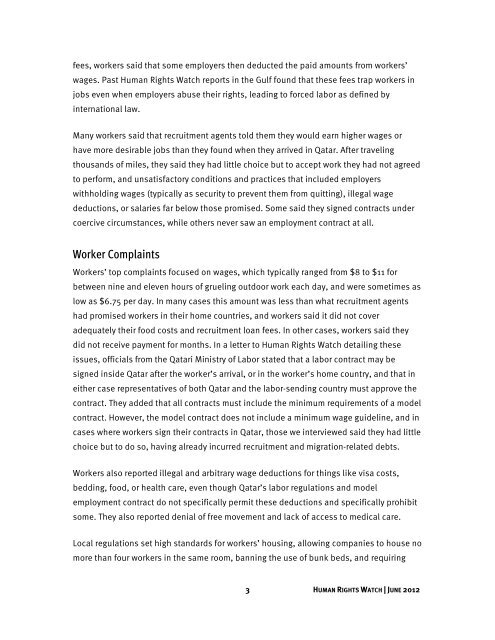Download the full report - Human Rights Watch
Download the full report - Human Rights Watch
Download the full report - Human Rights Watch
You also want an ePaper? Increase the reach of your titles
YUMPU automatically turns print PDFs into web optimized ePapers that Google loves.
fees, workers said that some employers <strong>the</strong>n deducted <strong>the</strong> paid amounts from workers’<br />
wages. Past <strong>Human</strong> <strong>Rights</strong> <strong>Watch</strong> <strong>report</strong>s in <strong>the</strong> Gulf found that <strong>the</strong>se fees trap workers in<br />
jobs even when employers abuse <strong>the</strong>ir rights, leading to forced labor as defined by<br />
international law.<br />
Many workers said that recruitment agents told <strong>the</strong>m <strong>the</strong>y would earn higher wages or<br />
have more desirable jobs than <strong>the</strong>y found when <strong>the</strong>y arrived in Qatar. After traveling<br />
thousands of miles, <strong>the</strong>y said <strong>the</strong>y had little choice but to accept work <strong>the</strong>y had not agreed<br />
to perform, and unsatisfactory conditions and practices that included employers<br />
withholding wages (typically as security to prevent <strong>the</strong>m from quitting), illegal wage<br />
deductions, or salaries far below those promised. Some said <strong>the</strong>y signed contracts under<br />
coercive circumstances, while o<strong>the</strong>rs never saw an employment contract at all.<br />
Worker Complaints<br />
Workers’ top complaints focused on wages, which typically ranged from $8 to $11 for<br />
between nine and eleven hours of grueling outdoor work each day, and were sometimes as<br />
low as $6.75 per day. In many cases this amount was less than what recruitment agents<br />
had promised workers in <strong>the</strong>ir home countries, and workers said it did not cover<br />
adequately <strong>the</strong>ir food costs and recruitment loan fees. In o<strong>the</strong>r cases, workers said <strong>the</strong>y<br />
did not receive payment for months. In a letter to <strong>Human</strong> <strong>Rights</strong> <strong>Watch</strong> detailing <strong>the</strong>se<br />
issues, officials from <strong>the</strong> Qatari Ministry of Labor stated that a labor contract may be<br />
signed inside Qatar after <strong>the</strong> worker’s arrival, or in <strong>the</strong> worker’s home country, and that in<br />
ei<strong>the</strong>r case representatives of both Qatar and <strong>the</strong> labor-sending country must approve <strong>the</strong><br />
contract. They added that all contracts must include <strong>the</strong> minimum requirements of a model<br />
contract. However, <strong>the</strong> model contract does not include a minimum wage guideline, and in<br />
cases where workers sign <strong>the</strong>ir contracts in Qatar, those we interviewed said <strong>the</strong>y had little<br />
choice but to do so, having already incurred recruitment and migration-related debts.<br />
Workers also <strong>report</strong>ed illegal and arbitrary wage deductions for things like visa costs,<br />
bedding, food, or health care, even though Qatar’s labor regulations and model<br />
employment contract do not specifically permit <strong>the</strong>se deductions and specifically prohibit<br />
some. They also <strong>report</strong>ed denial of free movement and lack of access to medical care.<br />
Local regulations set high standards for workers’ housing, allowing companies to house no<br />
more than four workers in <strong>the</strong> same room, banning <strong>the</strong> use of bunk beds, and requiring<br />
3 HUMAN RIGHTS WATCH | JUNE 2012

















